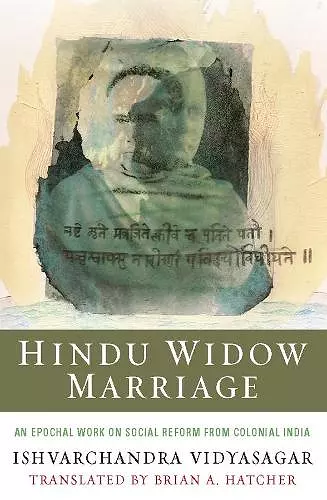Hindu Widow Marriage
Ishvarchandra Vidyasagar author Brian A Hatcher translator
Format:Hardback
Publisher:Columbia University Press
Published:25th Nov '11
Currently unavailable, and unfortunately no date known when it will be back

In this complex and finely wrought volume, Brian A. Hatcher provides the first full translation of Ishvarchandra Vidyasagar's treatise on why Hindu widows--many of them mere girls--should be allowed to marry. The work raised a furious storm in India when it was published in 1855, and few scholars have been as celebrated and vilified as Vidyasagar. Hatcher's splendid book pays homage to a man of dazzling character and ability while also introducing us to a maelstrom of difference--sexual, social, colonial--that even such a man could not tame. -- John Stratton Hawley, Barnard College Should Hindu widows be allowed to remarry? Hindu Widow Marriage brings together two master exegetes: Isvaracandra Vidyasagar, architect of the reforms that freed widows for remarriage in the mid-1850s; and Brian A. Hatcher, highly respected Vidyasagar expert. In this first complete English translation of the arguments that Vidyasagar marshaled, in Sanskrit and Bengali, Hatcher brings Vidyasagar's voice alive. I found myself liking Vidyasagar, appreciating his zest for argumentation, and thankful for his appeals on behalf of girls and women without sexual outlet. Sadly, Hindu widows today still need a Vidyasagar on their side. This makes Hindu Widow Marriage poignantly and powerfully prophetic. -- Rachel Fell McDermott, Barnard College, author of Revelry, Rivalry, and Longing for the Goddesses of Bengal: The Fortunes of Hindu Festivals
Before the passage of the Hindu Widow's Re-marriage Act of 1856, Hindu tradition required a woman to live as a virtual outcast after her husband's death. Widows were expected to shave their heads, discard their jewelry, live in seclusion, and undergo regular acts of penance. Ishvarchandra Vidyasagar was the first Indian intellectual to successfully argue against these strictures. A Sanskrit scholar and passionate social reformer, Vidyasagar was a leading proponent of widow marriage in colonial India, urging his contemporaries to reject a ban that caused countless women to suffer needlessly. Vidyasagar's brilliant strategy paired a rereading of Hindu scripture with an emotional plea on behalf of the widow, resulting in an organic reimagining of Hindu law and custom. Vidyasagar made his case through the two-part publication Hindu Widow Marriage, a tour de force of logic, erudition, and humanitarian rhetoric. In this new translation, Brian A. Hatcher makes available in English for the first time the entire text of one of the most important nineteenth-century treatises on Indian social reform. An expert on Vidyasagar, Hinduism, and colonial Bengal, Hatcher enhances the original treatise with a substantial introduction describing Vidyasagar's multifaceted career, as well as the history of colonial debates on widow marriage. He innovatively interprets the significance of Hindu Widow Marriage within modern Indian intellectual history by situating the text in relation to indigenous commentarial practices. Finally, Hatcher increases the accessibility of the text by providing an overview of basic Hindu categories for first-time readers, a glossary of technical vocabulary, and an extensive bibliography.
Hindu Widow Marriage threw down a major challenge to popular attitudes about the destinies of widows. It was both denounced by traditionalists and embraced by reformers. In his translation of and extensive introduction to Ishvarchandra Vidyasagar's text and context, Brian A. Hatcher brings to life the contentious debates within Calcutta's emerging middle class about how a modern world can be embraced within the framework of an enduring tradition. This book is a masterful contribution to our understanding of how traditional textual authority, prevailing social practices, and the pressures of colonialism collided and brought into being a religious and cultural world that was both in continuity with and a departure from the past. -- Paul Courtright, Emory University, coeditor of From the Margins of Hindu Marriage: Essays on Gender, Religion, and Culture Brian Hatcher is to be commended for giving them such detailed and responsible treatment and, thereby, making Vidyasagar's documents accessible to a wide scholarly audience. -- David Brick Journal of the American Oriental Society It is superbly researched and written, with useful resources that go a long way towards making the text intelligible to non-specialists. -- Ferdinando Sardella Journal of Hindu Studies Hatcher's masterly translation of Ishvarchandra Vidyasagar's Hindu Widow Remarriage affords us a rare opportunity to peer deeply into the world of the nineteenth-century Bengali intelligentsia... [this translation] must now be considered "required reading." International Journal of Hindu Studies A triumph of historical scholarship... Hatcher's translation of Vidyasagar's Bengali text is exemplary with its close attention to details and his concern for readability and integrity. His annotations are ample and meticulous. Orientalistische Literaturzeitung
ISBN: 9780231156332
Dimensions: unknown
Weight: unknown
272 pages